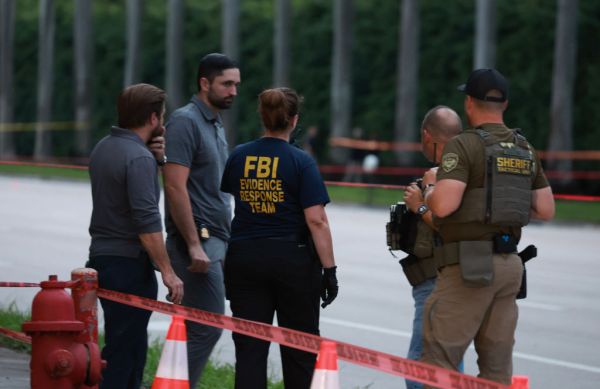Happy Tuesday! Asked by his head coach why he didn’t throw a pass on a key third down on Sunday, Green Bay Packers quarterback Malik Willis explained that the team’s center, Josh Myers, had vomited on the ball immediately prior to snapping it. He must have had some Spanish wine on the sidelines.
(This shoddy punchline is a test to make sure Steve is still reading this newsletter every morning.)
Quick Hits: Today’s Top Stories
- The man suspected of attempting to assassinate former President Donald Trump on Sunday at his golf course in West Palm Beach, Florida, was charged on Monday with two firearm possession violations, though no charges have yet been filed specifically related to his actions over the weekend. The would-be assassin has expressed violent sentiments toward Trump in the past: In a self-published book he authored last year, he called the former president a “buffoon,” “fool,” and “idiot,” though he also suggested that he’d voted for the former president in 2016. Authorities clarified the gunman’s weapon was an SKS-style firearm—a Soviet Union-era rifle—with an attached scope. Cell phone records show that the gunman’s phone had been near Trump’s golf course for about 12 hours before Secret Service agents identified him as a threat. Meanwhile, Florida Gov. Ron DeSantis announced on Monday that the state would conduct an independent investigation of the assassination attempt, separate from the ongoing investigations led by federal agencies.
- David Lin, one of three American citizens imprisoned in China whom the United States government recognizes as “wrongfully detained,” was unexpectedly freed on Sunday and returned to the U.S. after serving 18 consecutive years in Chinese prison. The 68-year-old Lin had worked as a pastor and was attempting to construct a Christian ministry center in China when he was arrested in 2006, charged with contract fraud, and given a life sentence. A senior U.S. government official told Politico that China first agreed to release Lin following a July meeting between U.S. Secretary of State Antony Blinken and Chinese Foreign Minister Wang Yi in Laos.
- Ukrainian government officials said on Monday that Russia unleashed a large-scale drone attack on the Ukrainian capital city of Kyiv that injured one person but inflicted no further casualties or damage to infrastructure. Monday’s was the eighth Russian aerial attack on the city this month alone, and the onslaught lasted for about three-and-a-half hours. Ukrainian defenses reportedly shot down 53 of the 56 Iranian-developed, kamikaze Shahed drones Russia launched at Kyiv. Meanwhile, Russian President Vladimir Putin issued an order on Monday to expand the official size of Russia’s military to a total of 1.5 million active-duty troops, an increase of 180,000 soldiers, effective on December 1. Putin last increased the size of the military in December 2023.
- The Treasury Department issued new sanctions on Monday against four citizens of the nation of Georgia—two senior government officials and two extremist media figures—for alleged human rights abuses, including violence against peaceful protesters. The State Department has accused two senior officials in the government’s internal affairs ministry of overseeing the brutal crackdown on peaceful protests by government security forces earlier this year. The other two individuals sanctioned were associated with Alt-Info—a Georgian extremist online website—and are accused of directly inciting violence against the protesters, while one also led an assault on non-government organization offices in Tbilisi, the nation’s capital city.
- The North American Aerospace Defense Command (NORAD) detected and tracked two Russian military aircraft flying off the coast of Alaska on Sunday, after reporting a nearly identical incident the day prior. In the last week alone, NORAD has detected and tracked four separate instances of Russian aircraft flying within Alaska’s Air Defense Identification Zone—a zone of international airspace in which all aircraft must identify themselves to U.S. authorities. Prior to last Wednesday, NORAD had detected and tracked only two such instances since May. Critically, all four NORAD alerts last week noted that Russian activity in the region “is not seen as a threat.”
- Nigerian officials announced on Sunday that 281 prisoners escaped their facility after intense flooding—caused by a breached dam—damaged the prison’s walls. Nigerian prison authorities are conducting operations to rearrest the escaped detainees, successfully capturing just seven thus far. The Nigerian regional governor, Babagana Zulum, told BBC that a number of the escapees were members of Boko Haram, the radical Islamic terrorist group prominent in Nigeria and other nearby countries.
‘I Would Have Loved to Have Sank That Last Putt’

During the summer of 1975, then-President Gerald Ford survived two separate attempts on his life—one by a devotee of serial killer Charles Manson and another by a single mother of four. The one-off attacks happened within just 17 days of each other. Nearly five decades later, history is rhyming.
A would-be gunman seemed poised to make another attempt on former President Donald Trump’s life on Sunday—the second in as many months after the attack on a Butler County, Pennsylvania, rally in July—before it was foiled by the Secret Service. New details are emerging about the suspect in the abortive attack, though his motives remain unclear—as do the precise needs of the Secret Service as they attempt to protect the candidates and their families in what the agency calls a “heightened and dynamic threat environment.”
Early Sunday afternoon, Trump was in the middle of a round of golf at his course at Trump International Golf Club. At around 1:31 p.m. ET, however, a Secret Service agent assigned to protect the president saw what appeared to be the tip of a rifle pointing out of a chain link fence in the tree line near the sixth green and opened fire. A man—who was reportedly within 500 yards of the president with a Soviet-era semi-automatic rifle—fled the scene on Interstate 95 in a Nissan SUV and was spotted by a witness who provided a physical description and a picture of the car’s license plate. “I would have loved to have sank that last putt,” Trump said on Monday night of not being able to finish his round of golf.
Law enforcement pursued and successfully apprehended the suspect—identified as Ryan Wesley Routh—who had been convicted of two felonies in North Carolina in 2002 and 2010. He appeared in federal court on Monday, facing charges of illegally possessing a firearm after his felony convictions made him ineligible to do so. In an additional federal charge, the criminal complaint also alleges he filed off the serial number of the rifle, leaving it “obliterated.” As the judge on Monday agreed to hold Routh in pretrial detention, he reportedly seemed relaxed.
Federal prosecutors have not yet charged Routh—who has apparently faced a litany of felony charges across the last several decades—with specific offenses related to an attempt to shoot Trump, though the FBI special agent in charge for the Miami field office, Jeff Veltri, said Monday the incident is being investigated as an “apparent assassination attempt of former President Trump.”
Investigators located Routh’s phone at the tree line of the course beginning around 2 a.m. Sunday morning, though it’s not clear whether Routh himself was there continuously for all 12 hours or how long Routh—who seems to hail from Hawaii and North Carolina—had been in Florida. At his location in the tree line of the club, law enforcement found a digital camera, a backpack, a black plastic bag with food in it, and a loaded rifle with a scope.
Trump’s round of golf was an “off-the-record” movement, meaning it wasn’t on his publicly announced schedule. Ronald L. Rowe—serving as the acting director of the Secret Service after his predecessor, Kimberly Cheatle, resigned following the July attempt on Trump’s life—seemed to say Monday that Secret Service agents had not done a full sweep of the course prior to the former president’s arrival. Instead, in what Rowe described as “textbook” procedure, a first wave of agents was moving several holes ahead of Trump, at which point one agent spotted Routh.
Despite Rowe’s exhortations that the Secret Service’s procedures worked as intended, the agency is once again facing scrutiny after it seemed to mishandle security at the Butler County, Pennsylvania, rally in July when an attacker shot Trump and several rallygoers—including one fatally—from a roof near the stage long after he’d first been spotted by law enforcement.
President Joe Biden said Monday that the agency “needs more help,” adding, “I think Congress should respond to their need.” In the aftermath of the July shooting, Biden authorized additional protection for Trump and Vice President Kamala Harris.
Unlike in Pennsylvania two months ago, officials on Monday insisted that Routh had not managed to shoot at the former president, nor ever had him in his sight-line. “The suspect didn’t even get close to getting a round off,” Palm Beach County Sheriff Ric Bradshaw said on Monday.
Given that Trump’s trip to the golf course on Sunday was not publicly announced, the question remains whether Routh knew for certain that Trump would be there, and if so, how. “I think that’s the question that the FBI and Secret Service are laser-focused on today,” said William Snyder—the Martin County, Florida, sheriff whose officers were involved in Routh’s arrest on Sunday—in a separate press conference. “Is this guy part of a conspiracy? If he’s a lone gunman, President Trump is that much safer, because we have him. If he’s part of a conspiracy, then this whole thing really takes on a very ominous tone.” The FBI said on Monday that there is no indication currently that Routh was acting in concert with others.
Routh’s motives are also still unclear. The 58-year-old had been quoted in Newsweek Romania, Semafor, and the New York Times in recent years related to his often fruitless efforts to recruit international soldiers to fight for Ukraine against Russia. Several Ukrainian military units denied any connection to Routh on Monday, and an American woman who worked with the Ukrainian International Legion until June told the Washington Post that Routh had been in contact with her but was never deputized to help recruit international soldiers and that she’d been warning people away from him.
Routh seemed to hold idiosyncratic political views, saying in a self-published book that he’d voted for Trump in 2016 while also, at various times, indicating support online for left-wing Sen. Bernie Sanders of Vermont and former Democratic Rep. Tulsi Gabbard of Hawaii. He apparently voted in the Democratic primary in North Carolina in March. “DEMOCRACY is on the ballot and we cannot lose,” he tweeted in April, seemingly in support of the Biden-Harris ticket. In that same self-published book, he encouraged Iran to assassinate Trump.
Unlike the immediate aftermath of the first attempt to assassinate Trump—when the former president called for calm—Trump and his allies have pointed the finger at Democrats, saying their rhetoric about Trump caused the attack, as Dispatch Politics has reported. But such accusations began even before this attempt on the former president’s life. “I probably took a bullet to the head because of the things they say about me,” Trump said during last week’s debate. “They talk about democracy, I’m a threat to democracy. They’re the threat to democracy.”
Trump reiterated that sentiment on Monday in an interview with Fox News. “He believed the rhetoric of Biden and Harris, and he acted on it,” Trump said of Routh. “Their rhetoric is causing me to be shot at, when I am the one who is going to save the country, and they are the ones that are destroying the country—both from the inside and out.”
Rowe, the acting director of the Secret Service, said on Monday that Secret Services agents were working in a “heightened and dynamic threat environment,” and indeed, prior to the apparent attempt on Trump’s life on Sunday, the threat of political violence seemed concentrated on the town of Springfield, Ohio. The state’s Republican Gov. Mike DeWine said Monday that there would be additional state law enforcement present in the Springfield school district beginning Tuesday after the town received more than 30 bomb threats in the last several days, apparently in response to racist lies about Haitian immigrants—promoted by Trump and his running mate, Sen. J.D. Vance of Ohio. Two elementary schools were evacuated for bomb threats on Monday alone and members of the Proud Boys, a far-right militia group, were seen in Springfield over the weekend.
In Florida on Monday, the U.S. Attorney for the Southern District of Florida was among the officials addressing members of the media. “Together we will continue to work tirelessly to ensure accountability,” said Markenzy Lapointe, who happens to be the first Haitian-born American to serve as U.S. attorney.
Worth Your Time
- With the Federal Reserve meeting this week, what should guide the central bankers’ looming decision on whether to cut rates? “The Fed should be setting monetary policy in a forward-looking manner, based on its best understanding of current conditions and forecasts of future conditions,” Stan Veuger and Mikkel Davies wrote in Foreign Policy. “It has deviated significantly from this practice in recent years, perhaps most explicitly when it started relying heavily on what economists call ‘forward guidance,’” they wrote. “Forward guidance may sound forward-looking, but it’s actually the opposite. When I tell you today what I will do tomorrow, tomorrow I will have based my action on what I knew yesterday, instead of actually reacting to the moment. … Current Fed attitudes—the preference for waiting until the last moment to start a new loosening or hiking cycle, the fear of going back and forth—exacerbate such short-run interest rate dynamics. The Fed needs to let go of those attitudes and focus on what can be, unburdened by what has been.”
- Has the Sudanese civil war—a bloody and devastating armed conflict that began 16 months ago—become a “forgotten war”? “Sub-Saharan Africa has had more than its share of political upheaval and violence, and perhaps that is a reason why yet another war does not attract attention in the West,” Lawrence Freedman wrote for his Substack, Comment is Freed. “The problem is the lack of agreement on how to stop it. … Sudan has a history of coups and internal violence. It has not known a lot of peace since it gained independence from the UK in 1956. … But without a peace of some sort then it is impossible to address the structural problems that have created the conditions for such regular surges of violence. These historic and entrenched cycles of violence can lead to fatalism. Sudan risks being left in the diplomatic ‘just too difficult’ basket, not worth the expenditure of resources and effort required to bring together parties who find that war works for them as well as peace.”
Presented Without Comment
New York Times: Brazilian Politician Upends Debate by Hitting Opponent With Chair
Also Presented Without Comment
The Guardian: RFK Jr. Says He Faces Federal Investigation For Beheading Whale
In the Zeitgeist
It’s been less than two weeks since the new NFL season kicked off, yet a spectacular play from the Minnesota Vikings has already broken last season’s record for longest completed pass. It was good news for TMD’s Peter Gattuso, whose fantasy football team benefited from Justin Jefferson’s 97-yard reception—but the referee here is also offering a fairly impressive display of athleticism:
Toeing the Company Line
- In the newsletters: Kevin reported from Springfield, Ohio, on the story that wasn’t, the Dispatch Politics team covered how Trump allies reacted to news of the second assassination attempt, and Nick responded (🔒) to David Frum’s bullishness on Harris’ chances for victory.
- On the podcasts: Sarah and David record Advisory Opinions live at Princeton, discussing elite university “neutrality” and another potential Supreme Court leak.
- On the site: Charlotte reports from northern Israel on Hezbollah’s increasingly aggressive attacks in the region and Chris argues the cat memes are making Trump acolytes look desperate.
Let Us Know
Is political rhetoric responsible for the would-be assassination attempt on Trump?









Please note that we at The Dispatch hold ourselves, our work, and our commenters to a higher standard than other places on the internet. We welcome comments that foster genuine debate or discussion—including comments critical of us or our work—but responses that include ad hominem attacks on fellow Dispatch members or are intended to stoke fear and anger may be moderated.
With your membership, you only have the ability to comment on The Morning Dispatch articles. Consider upgrading to join the conversation everywhere.